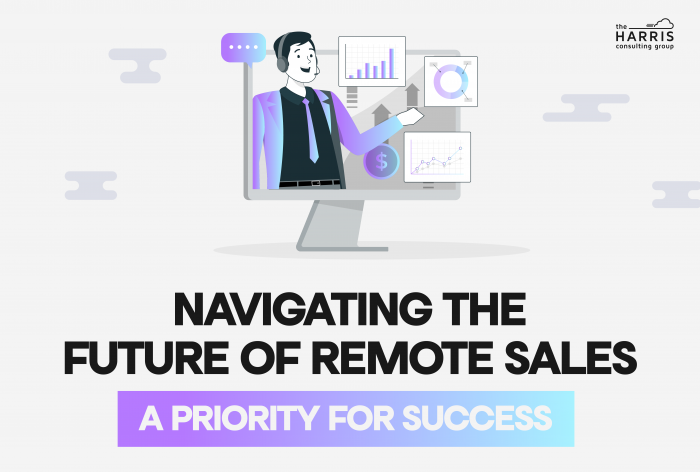People have been doing “remote sales” for decades. It was called Field Sales, Outside Sales, and of course we can confirm this because of the term Inside Sales.
With the advent of Work From Home (WFH), remote selling has now become a cornerstone of organizational strategies. It has reshaped the way businesses connect with their employees, customers and conduct their entire revenue operations.
The shift towards remote sales is not merely a response to external factors but reflects a strategic evolution. As we navigate the future of remote sales, businesses must recognize the importance of prioritizing and adapting to the changing dynamics of this paradigm.
Embracing technology-enabled communication tools, optimizing virtual collaboration platforms, and fostering a culture of agility and resilience are crucial elements for success in this new era of sales.
The Rise of Remote Sales = The Rise of Remote Purchasing
Remote sales have evolved into an integral and transformative aspect of the contemporary business landscape. It has always existed, and then in 2020 the world changed and it became the norm.
Just like every other industry, Covid had a massive impact on the traditional sales model. The traditional sales model of in-person sales interactions has progressively yielded ground to virtual engagement.
This shift is not merely a transient response to changing circumstances. This reflects a fundamental restructuring of how businesses approach customer engagement, leveraging technology to enhance the sales process.
The global acceleration of the work from home and remote sales role has played a pivotal role in expediting the adoption of virtual sales strategies. What many fail to recognize is the buyer behavior changed their desired buyer’s experience as much as the seller’s journey.
Customers are now more comfortable buying without ever meeting someone in person. Companies are compelled to have innovative tools and techniques that facilitate effective virtual interactions between sales teams and clients.
Moreover, virtual communication platforms, digital collaboration tools, and advanced analytics are now essential components of the remote sales toolkit. This enables organizations to navigate the challenges of a distributed workforce and ensure that they remain competitive.
Embracing this paradigm shift allows businesses not only to adapt to the new normal but also to unlock opportunities for:
- increased efficiency,
- broader market reach and
- enhanced customer experiences.
One Cannot Automate Humanity With Technology. Not Yet.
Most people think the backbone of successful remote sales lies in leveraging cutting-edge technology. Customer Relationship Management (CRM) systems, virtual meeting platforms, engagement platforms and data analytics tools play a pivotal role in streamlining sales processes and improving customer interactions.
Embracing artificial intelligence and machine learning can provide valuable insights. Except that is only 49% of the solution. The other 51% falls on the organization and sales leader.
Machines will eliminate the humanity in sales. Teaching conversational selling is now, and frankly, always has been what separates the best sales people from the bad sales people.
Nobody walks in the door “knowing everything” about how to sell, even if they say they do. And we mean this for everyone. If they claim to know everything, ask them to explain how “quantum computing” is going to accelerate sales and revenue operations exponentially.
The organization and sales leader must provide sales training to enable them to make informed decisions and enhance their overall efficiency.
Building Strong Connections:
Establishing meaningful relationships with customers is crucial in selling. This is even more crucial in a virtual setting. Our role in sales is simple. It is to reduce the risk someone feels in making a decision and we do this by getting them to fall in trust with us. Not fall in love with us.
What is really cool is that we can build this relationship more easily in a digital world than a physical world. By utilizing video calls, personalized emails, and interactive presentations can help create a more engaging and human connection.
Companies should invest in sales training programs that include a technical skills development program in addition to one that improves the soft skills of sales and communication.
Data-Driven Decision Making:
The future of remote sales is inherently linked to data-driven decision-making. Analyzing customer behavior, preferences, and market trends allows organizations to tailor their sales strategies for maximum impact.
Moreover, this data can directly affect the sales skills development that your sales team needs to improve sales pipeline and sales funnel conversions to closed won opportunities.
Implementing robust analytics tools enables sales teams to adapt to changing market dynamics, identify new opportunities, and refine their approach based on real-time insights.
Flexibility and Agility:
The remote sales landscape is characterized by its dynamic nature. Businesses need to be agile and adaptable to stay ahead of the curve. This involves continuously reassessing and refining sales strategies, embracing new technologies, and staying attuned to customer needs.
Flexibility in adapting to unforeseen circumstances, such as global events or shifts in consumer behavior, is key to long-term success in the world of remote sales.
Training and Development:
Investing in the professional development of sales teams is paramount. The skills required for successful remote sales are distinct from those needed in a traditional setting.
Sales training programs should focus on digital communication, virtual selling techniques, and proficiency with sales technology. Regular skill assessments and ongoing learning initiatives will ensure that sales teams remain competitive in the evolving remote sales landscape.
As we navigate the future of remote sales, it is evident that embracing change and leveraging technology are critical for success. Businesses that prioritize building strong virtual connections, making data-driven decisions, and fostering a culture of flexibility and adaptability will emerge as leaders in the remote sales era.
By investing in the right tools and providing ongoing training, organizations can position themselves to thrive in the world of remote sales. The future is digital, and those who navigate it effectively will undoubtedly reap the rewards of sustained success.







